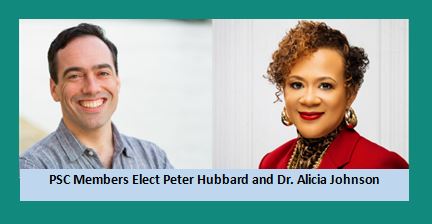Rate Hikes and Energy Costs Drive Rare Democratic Wins in Georgia PSC Races
Share

‘Enough Is Enough’ Says Voters to Rogue PSC
ATLANTA — Georgia voters sent a clear message Tuesday: they’ve had enough of rising power bills. In a stunning political upset, two Democrats — Alicia Johnson and Peter Hubbard — won statewide seats on the Georgia Public Service Commission (PSC), breaking the Republican Party’s total control of the powerful utility-regulating board for the first time in nearly 20 years.
The victories, driven by widespread frustration over repeated electricity rate hikes and concerns about Georgia Power’s long-term energy strategy, mark one of the few times in recent memory that Democrats have captured statewide offices outside of U.S. Senate contests. “This election was about kitchen-table issues — people are tired of paying more and getting less,” said Charlie Bailey, chairman of the Democratic Party of Georgia. “Republicans have spent years helping corporations and billionaires enrich themselves on the backs of working families. Georgians said, ‘Enough is enough.’”

A Vote About the Pocketbook
For months, voters have watched their utility bills creep upward ovee a half dozen times as Georgia Power implemented multiple rate increases — decisions approved by the very commissioners now voted out of office.Tim Echols, first elected to the PSC in 2010, and Fitz Johnson, appointed in 2021, had defended the hikes as necessary investments to maintain grid reliability and support economic growth. But their opponents framed the moves as evidence of a commission that had grown too cozy with the monopoly utility it regulates, a billion dollar company.
“It felt like every few months there was another notice from Georgia Power — another increase,” said a retiree from Gwinnett County. “People are hurting, and the PSC seemed more interested in helping the company than the customers.”
Democrats Johnson and Hubbard campaigned squarely on that frustration, promising more transparency, renewable energy expansion, and stronger protections for ratepayers. Both criticized the PSC’s continued approval of rate adjustments tied to the over-budget Plant Vogtle nuclear expansion and the push for more natural gas turbines to serve data centers.
Hubbard, a longtime solar energy advocate, said during his campaign that Georgia’s overreliance on fossil fuels would only drive rates higher in the long term. “Families are paying the price for poor planning and shortsighted policy,” Hubbard said during a debate. “We need a future where Georgia’s energy system works for everyone, not just shareholders.”
Historic Shifts and Political Ripples
The results were decisive. Johnson and Hubbard each captured nearly 900,000 votes statewide — more than 300,000 ahead of their Republican rivals. In Cobb County, they dominated, each earning over 71% of the vote.
It was a remarkable showing for Democrats in a state where Republicans have maintained a tight grip on the PSC for nearly two decades. The last time Democrats celebrated a comparable statewide win was when Jon Ossoff and Raphael Warnock captured U.S. Senate seats in 2021.
Although Republicans will retain a 3–2 majority on the commission, Democrats will now hold meaningful sway in shaping energy policy discussions — particularly as the PSC weighs Georgia Power’s proposal to expand its fleet of natural gas turbines amid surging electricity demand from data centers.
Ratepayers Send a Message
Analysts say the outcome underscores how economic concerns — not partisan politics — drove turnout.“When people’s power bills rise, it doesn’t matter if they’re Democrat or Republican,” said Dr. Marilyn Cook, a political scientist at Georgia State University. “The PSC races are often overlooked, but this time, voters connected the dots between those commissioners and their pocketbooks.”
Republicans Echols and Fitz Johnson had both warned of low turnout among conservative voters, particularly with municipal elections dominating local ballots. That concern proved prophetic: turnout was more than 20 times higher than the GOP primaries in June, an indicator that Democrats successfully mobilized frustrated consumers.
What Comes Next
While the new Democratic commissioners will take office with limited immediate power to reverse recent rate increases, their presence could shift the tone and transparency of the PSC’s future decisions.
Both have pledged to push for public accountability, more frequent ratepayer hearings, and policies encouraging solar and renewable energy investments to reduce long-term costs.
Still, for many Georgians, Tuesday’s results felt like more than a political shift — they felt like a protest vote. “I’m not political,” said Danielle Murphy, an Atlanta mother of three. “But when your power bill keeps going up, you start paying attention to who’s approving it. This was my way of saying, ‘Stop making life harder for us.’”
With voters sending two new voices to the PSC, the message is clear: rising rates have become a political liability, and Georgia’s energy future may now look a little brighter for the people footing the bill.


